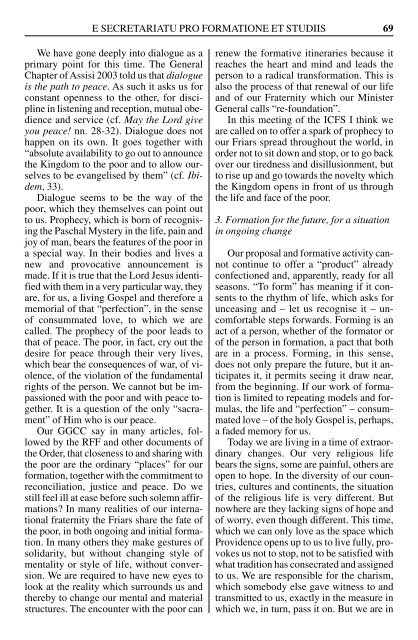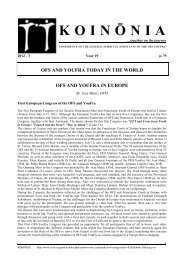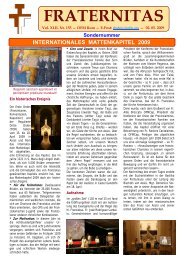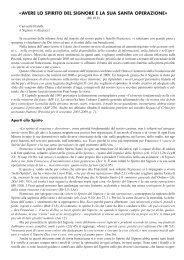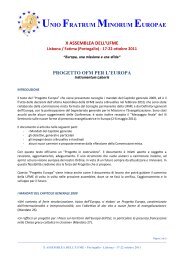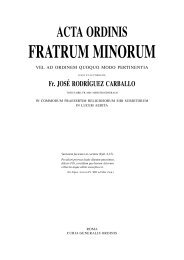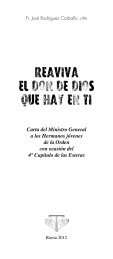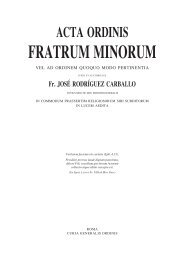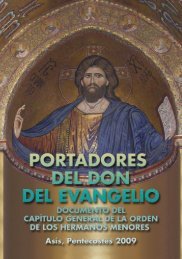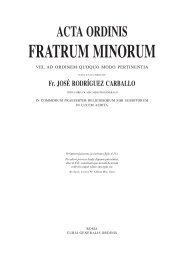FRATRUM MINORUM - OFM
FRATRUM MINORUM - OFM
FRATRUM MINORUM - OFM
Create successful ePaper yourself
Turn your PDF publications into a flip-book with our unique Google optimized e-Paper software.
E SECRETARIATU PRO FORMATIONE ET STUDIIS<br />
We have gone deeply into dialogue as a<br />
primary point for this time. The General<br />
Chapter of Assisi 2003 told us that dialogue<br />
is the path to peace. As such it asks us for<br />
constant openness to the other, for discipline<br />
in listening and reception, mutual obedience<br />
and service (cf. May the Lord give<br />
you peace! nn. 28-32). Dialogue does not<br />
happen on its own. It goes together with<br />
“absolute availability to go out to announce<br />
the Kingdom to the poor and to allow ourselves<br />
to be evangelised by them” (cf. Ibidem,<br />
33).<br />
Dialogue seems to be the way of the<br />
poor, which they themselves can point out<br />
to us. Prophecy, which is born of recognising<br />
the Paschal Mystery in the life, pain and<br />
joy of man, bears the features of the poor in<br />
a special way. In their bodies and lives a<br />
new and provocative announcement is<br />
made. If it is true that the Lord Jesus identified<br />
with them in a very particular way, they<br />
are, for us, a living Gospel and therefore a<br />
memorial of that “perfection”, in the sense<br />
of consummated love, to which we are<br />
called. The prophecy of the poor leads to<br />
that of peace. The poor, in fact, cry out the<br />
desire for peace through their very lives,<br />
which bear the consequences of war, of violence,<br />
of the violation of the fundamental<br />
rights of the person. We cannot but be impassioned<br />
with the poor and with peace together.<br />
It is a question of the only “sacrament”<br />
of Him who is our peace.<br />
Our GGCC say in many articles, followed<br />
by the RFF and other documents of<br />
the Order, that closeness to and sharing with<br />
the poor are the ordinary “places” for our<br />
formation, together with the commitment to<br />
reconciliation, justice and peace. Do we<br />
still feel ill at ease before such solemn affirmations?<br />
In many realities of our international<br />
fraternity the Friars share the fate of<br />
the poor, in both ongoing and initial formation.<br />
In many others they make gestures of<br />
solidarity, but without changing style of<br />
mentality or style of life, without conversion.<br />
We are required to have new eyes to<br />
look at the reality which surrounds us and<br />
thereby to change our mental and material<br />
structures. The encounter with the poor can<br />
renew the formative itineraries because it<br />
reaches the heart and mind and leads the<br />
person to a radical transformation. This is<br />
also the process of that renewal of our life<br />
and of our Fraternity which our Minister<br />
General calls “re-foundation”.<br />
In this meeting of the ICFS I think we<br />
are called on to offer a spark of prophecy to<br />
our Friars spread throughout the world, in<br />
order not to sit down and stop, or to go back<br />
over our tiredness and disillusionment, but<br />
to rise up and go towards the novelty which<br />
the Kingdom opens in front of us through<br />
the life and face of the poor.<br />
3. Formation for the future, for a situation<br />
in ongoing change<br />
69<br />
Our proposal and formative activity cannot<br />
continue to offer a “product” already<br />
confectioned and, apparently, ready for all<br />
seasons. “To form” has meaning if it consents<br />
to the rhythm of life, which asks for<br />
unceasing and – let us recognise it – uncomfortable<br />
steps forwards. Forming is an<br />
act of a person, whether of the formator or<br />
of the person in formation, a pact that both<br />
are in a process. Forming, in this sense,<br />
does not only prepare the future, but it anticipates<br />
it, it permits seeing it draw near,<br />
from the beginning. If our work of formation<br />
is limited to repeating models and formulas,<br />
the life and “perfection” – consummated<br />
love – of the holy Gospel is, perhaps,<br />
a faded memory for us.<br />
Today we are living in a time of extraordinary<br />
changes. Our very religious life<br />
bears the signs, some are painful, others are<br />
open to hope. In the diversity of our countries,<br />
cultures and continents, the situation<br />
of the religious life is very different. But<br />
nowhere are they lacking signs of hope and<br />
of worry, even though different. This time,<br />
which we can only love as the space which<br />
Providence opens up to us to live fully, provokes<br />
us not to stop, not to be satisfied with<br />
what tradition has consecrated and assigned<br />
to us. We are responsible for the charism,<br />
which somebody else gave witness to and<br />
transmitted to us, exactly in the measure in<br />
which we, in turn, pass it on. But we are in


